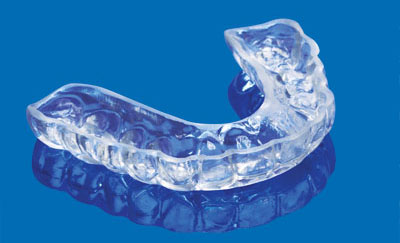What is Bruxism?
Significant wear of the maxillary front teeth is an indication of bruxism. Source: https://en.wikipedia.org/wiki/Bruxism#/media/File:Deviated_midline_2.JPG
Bruxism is when you clench (tightly hold your top and bottom teeth together) or grind (slide your teeth back and forth over each other) your teeth. Bruxism is defined as the gnashing and grinding of the teeth without a functional purpose. In general your teeth should only contact each other while chewing or swallowing. Bruxism is considered a para-functional oral habit. Meaning it is involuntary rhythmic or spasmodic non-functional gnashing, grinding or clenching of teeth in other than chewing movements which can damage your teeth, injure muscles you chew with, and/or damage your jaw joints.
There are two forms of bruxism, both sleep bruxism and day time bruxism. While both can damage teeth, the vast majority of patients suffer from sleep bruxism. While the two are not mutually exclusive, for our purposes, this article focuses on sleep bruxism.
Sleep Bruxism is considered a sleep Disorder
According to the International Classification of Sleep Disorders sleep bruxism is classified as sleep-related movement disorder, one described as a rhythmic, repetitive, and involuntary activity of the muscles of the jaw, that manifests during sleep. All forms of bruxism involve forceful contact between the biting surfaces of the upper and lower teeth. This contact involves movements of the lower jaw, often this can produce strange and unpleasant sounds. Clenching, on the other hand, involves inaudible, sustained, forceful tooth contact without any significant jaw movements.
What causes Bruxism?
Unfortunately what causes bruxism is unknown. The etiology is a complex physiological process which involves different functional pathways related to sleep, response to stress, brain activity, muscle activity, cardiac function, and breathing. What is known is that bruxers tend to be more depressed than non-bruxers, and they experience higher levels of hostility and stress sensitivity. Studies have shown that bruxing children tend to be more anxious than non-bruxers. Likewise, Often people who clench or grind their teeth during sleep are more likely to have other sleep disorders, such as snoring and pauses in breathing (sleep apnea) and Gastroesophageal Reflux Disease (GERD). It should also be noted that certain anti-depressant medications have been known to induce bruxism. Often changing your medication may be necessary.
What are the symptoms of Bruxism?
Signs and symptoms of bruxism may include:
Muscles of Mastication Source: https://commons.wikimedia.org/wiki/File:1108_Muscle_that_Move_the_Lower_Jaw.jpg
- Teeth grinding or clenching, which may be loud enough to awaken your sleep partner
- Teeth that are flattened, fractured, chipped or loose
- Worn tooth enamel, exposing deeper layers of your tooth
- Increased tooth sensitivity
- Jaw or face pain or soreness
- Tired or tight jaw muscles
- Pain that feels like an earache, though it's actually not a problem with your ear
- Dull headache originating in the temples
- Damage from chewing on the inside of your cheek
- Indentations on your tongue
Typically patients who suffer from bruxism tend to have morning headaches or muscle soreness in the head and neck. This is due to the constant flexing of the jaw muscles.
How Common is Bruxism?
Sleep bruxism is quite common, occurring in around seven to eight percent of the general population. It’s more frequent among children and adolescents, with up to 40 per cent of 11 year-old children being affected. Bruxism can start when the first baby teeth appear. As we age the likelyhood bruxixm declines. Sleep bruxism shows no preference in terms of gender, but awake bruxism is more common in females.
A photo of a typical bite guard. Source: http://www.huffingtonpost.com/patricia-yarberry-allen/dental-health-and-menopau_b_250176.html
How is bruxism treated?
Recommended treatments for bruxism include behavioural therapies and using occlusal splints or "bite guards". Bite guards are designed to even out the pressure across your jaw and create a physical barrier between your upper and lower teeth to protect them from further damage. A bite guard is made from hard plastic and fits precisely over your upper or lower teeth. Other treatments, such as muscle relaxation exercises and sleep hygiene measures, may also help you manage your symptoms.
Medications used to treat bruxism
Medication isn't usually used to treat bruxism. But non-steroidal anti-inflammatory drugs (NSAIDs) such as ibuprofen may help relieve any pain or inflammation you have around your jaw as a result of grinding your teeth. In some cases taking a muscle relaxant before you go to bed to help relieve your symptoms temporarily.
“Just a little note to say thank you. I am truly blessed from God that you came into my life two years ago. You are a very and compassionate person. We must always have a good spirit and, of course, a smile.
From the bottom of my heart, thank you.”



